Yang Chow fried rice 扬州炒饭 is synonymous to Chinese fried rice to many people.
The question is: How to prepare fried rice at home full of wok-hei (wok aroma) comparable to that generated with the high power stove by the Chinese restaurant?
I spent the whole last week to modify how I cook in the restaurant, and finally found a workaround way that you can do it at home with a small stove and a frying pan.
Let’s find out in this article.
Note: There are different translations of the four Chinese characters 扬州炒饭: Yangzhou fried rice, Yeung Chow fried rice which refers to the same dish.
Note: This post may contain affiliate links. Please read my privacy policy for more info. I may receive commissions for purchases made through links in this post.
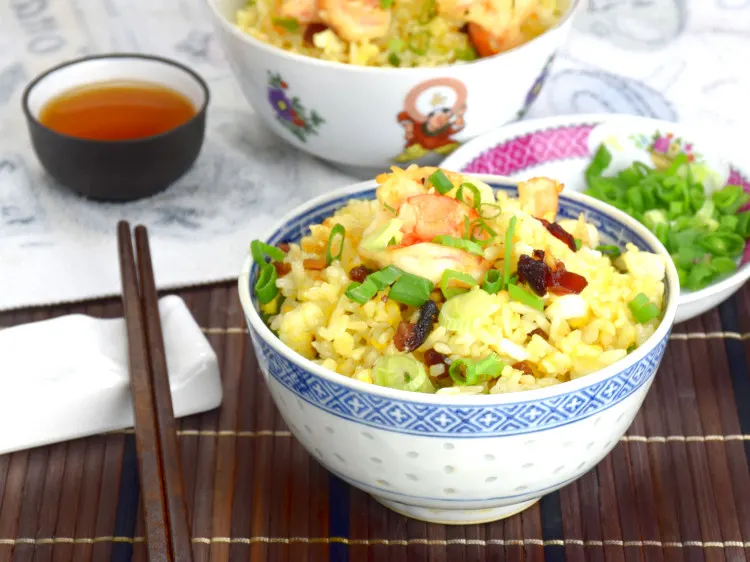
Step 1: Prepare the ingredients
Shrimps and Chinese barbecue pork (Char Siu) is the main ingredients for Yang Chow fried rice. This fried rice has become the generic name of Chinese fried rice, house fried rice, special fried rice. Different restaurants may use other ingredients to make their Yang Chow fried rice stands out from the others. The recipe below has shrimps and Char Siu, which is a more traditional one among various versions.
Shrimps
Wash, remove the head, tail, and shell. Devein.
If the shrimps are small, mix them with the fried rice to serve. I got a few bigger ones today, so I will pick them up from the rice after cooking and place them on top as the garnish.
Char Siu
Char Siu is the Chinese name of barbecue pork. It is widely popular among the Chinese. I suggest you purchase it from the store, or you can also make it with the oven by following the Char Siu recipe on this blog.
I prefer the Char Siu with some fats, which will release some pork fat into the oil. Cut the Char Siu into small cubes is the conventional way of presenting it in the restaurants. You can cut them into slice if you like.
Scallion
Cut the scallion crosswise into short pieces. Scallion is the standard ingredient for fried rice. It goes well with almost all types of Chinese food.
Use half of the scallion to stir-fry with the rice. Sprinkle the other half on the rice right before serving as the garnish.
Garlic
Saute some minced garlic with some vegetable oil until it turns aromatic. Remove it from the pan before adding the shrimps. Otherwise, the garlic will get burned if you fry it along with the shrimps.
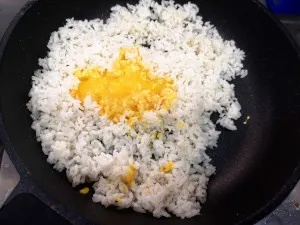
Eggs
The egg is the essential ingredients for all fried rice. We intentionally separate the egg yolks from the egg whites in this recipe, as we want to coat the rice with the yolks only to make the rice looks golden/yellowish.
Coating the rice with egg yolks serve two purposes:
- The rice covered with egg yolks looks attractive. Therefore it is called Colden Fried Rice 黄金炒饭 in Cantonese since it has a bright yellow color, which looks significantly different from others.
- The rice grains are coated with the cooked egg yolks, which prevent the starch of the rice from contacting directly with the saucepan/wok. The coated rice will not stick to the surface even though it is cooked over high heat. It is like the cooked egg in the pan which will not stick even over high heat.
The egg whites are cooked separately and scrambled into small white pieces.
The rice
Leftover rice is ideal for frying as it is drier and less sticky. If you use fresh rice, spread the rice as a thin layer on a large plate and let it air under the fan for fifteen minutes. The rice will become less sticky after losing some moisture.
Break up the lumps if the rice clumps together. It is difficult to break the lumps in the pan once you start to fry in the small pan.
Seasoning
Salt is the only seasoning I use in this recipe. (You can add some ground white pepper if you wish).
Light soy sauce is omitted since the color of the sauce will darken the ‘golden’ color of the rice.
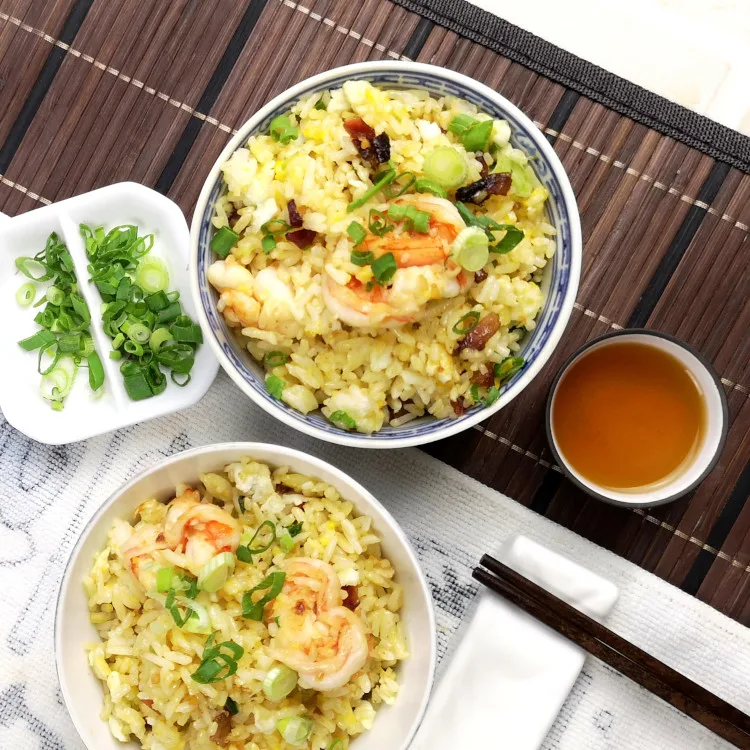
Step 2: How to prepare Yang Chow fried rice with ‘wok aroma’ with a small stove
Note: The following method has been tested and is proven works well by using a small gas stove (the home-used type) and with a frying pan with a nonstick surface.
The result is the Yang Chow fried rice with an abundance of wok aroma (wok-hei) that can rival wok fried version for the restaurants,
Saute the garlic
Saute the garlic with some vegetable oil over low heat until it turns aromatic. I do not fry the garlic until it is crispy as for the Japanese fried rice. The point is to let the garlic infuse the oil that is used to fry the rice later, not to make crispy garlic.
Remove the garlic from the pan.
Pan-fried the shrimps
Use the garlic oil to pan fry the shrimps. Flip the shrimps over so that both sides are cooked, that is when they turn pinkish.
Remove the shrimps from the pan. Now the oil is infused with the flavor of garlic and shrimps.
Pan-fried the Char Siu
Now we want to fry the Char Siu with the shrimp oil briefly. You may need to add some oil if necessary.
Since Char Siu is precooked, you only need to stir-fry it briefly so that the flavor is getting into the oil.
Remove the Char Siu. Now you have the richly flavored oil in the pan ready to fry the rice.
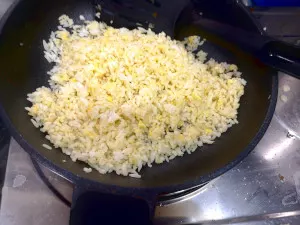
Coat the rice with the egg yolks
Put the rice in the pan, mix with the flavored oil. Season with salt.
Pour the beaten egg yolks to the rice. Coat the rice thoroughly with the egg yolks.
Stir-fry over low heat until the egg yolk is set. Now you have all the rice grains encased in the egg, like having many mini omelets with the rice as the filling!
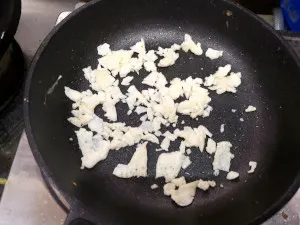
Fry the egg whites
Remove the rice from the pan. Add some oil and cook the egg whites. Keep stirring it and scramble the whites into small pieces.
Fry the rice with the garlic/shrimp/Char Siu oil
Add the rice, shrimps, Char Siu, and garlic back to the pan.
Add a tablespoon of scallion. Stir-fry over highest heat possible that can generate by the small stove for a minute.
Fry the rice over high heat in batches
So far I am preparing the Yang Chow fried rice pretty much like the way how I do it with the wok over a high power stove.
Preparing fry rice with wok aroma is not all about applying high heat from the beginning. On the contrary, high heat is required only during the final stage of cooking.
So far my small stove has performed well, just as good as the wok stove in the restaurants. That is because it has not reached the stage when I need high heat to create the much-needed wok aroma.
However, it will FAIL me when it comes to generating wok aroma if I do not adopt another method that works for using a small stove.
So the real test begins here. Since it is impossible for the small stove to generate sufficient heat to fry the rice, I am using a workaround way to achieve the same effect.
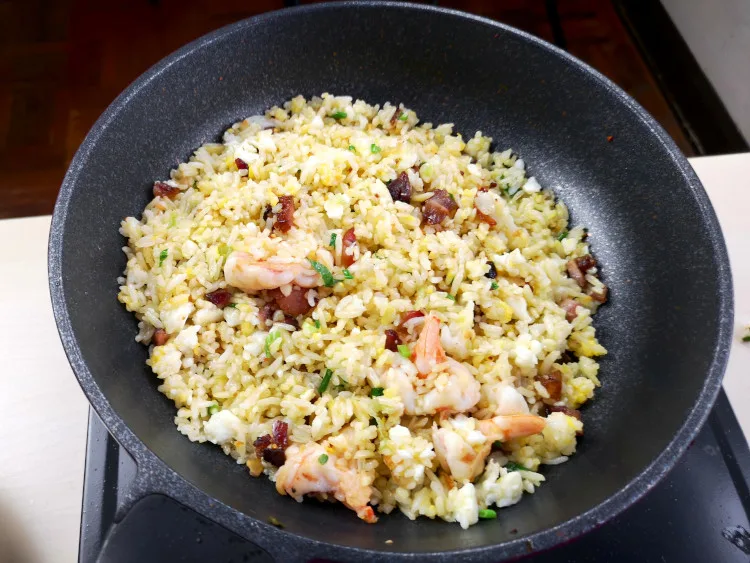
Here is my method:
- Heat the frying pan over the stove before adding the rice. Set the stove to maximum output. This method enables the rice to receive maximum heat once it touches the pan, very much resemble the wok over the high power stove.
- Fry in a small batch. The stove is unable to sustain the high temperature if I fry all the rice in one batch (250g of cooked rice in this case). The initial high heat will dissipate quickly. To temperature will be too low to produce any wok aroma. To counter this problem. I have divided the total amount into three portions.
- Stir and flip swiftly. Pour the first portion into the hot pan and stir-fry quickly, mimicking the toss and flip action while using the wok. Let each grain of rice touches the hot surface only for a split of a second and being tossed up again. You can hear the sound of the rice popping up from the pan. The rice will get burn if you let it idle on the pan. The same action is used by the restaurant chef, showcasing their wok skills by tossing a wok of fried rice non-stop over high heat,
- Do a smell test. Bring the pan up and take a sniff to detect the aroma. The high-heat-quick-frying method will create the wok aroma through the Maillard reaction. Continue frying until the aroma is produced. Remove from the pan immediately. Prolong frying will char the rice and make it extremely dry.
- Repeat the same process for the remaining portions. Each portion takes only less than a minute. It won’t take long. It is a feasible workaround method.
- Add more scallions
- Put the rice in the bowl. Arrange the shrimps on top. Add more scallions to garnish and serve.
Conclusion
I compare the Yang Chow fried rice prepared by using this method with the wok frying that we serve to our customers. I must say the aroma you can smell in front of the wok over high heat is much more intense compared with the small stove. However, the difference becomes insignificant once it is transferred to the plate and serves. Perhaps this is due to a large amount of rice we cook with the wok.
Need more information about fried rice?
Check out these articles which provide all the information you need to prepare Chinese fried rice:
1. Shrimp fried rice – how to cook to get the best result (trade secrets)
2. How to cook the best Chinese fried rice with only six ingredients
3. How to cook the best restaurant-style fried rice
The Yang Chow Fried Rice Recipe

Yang Chow fried rice 扬州炒饭 Recipe
Yang Chow fried rice (扬州炒饭, Yangzhou fried rice, Yeung Chow fried rice ) is synonymous to Chinese fried rice to many people. Whenever we dine or order takeout at the Chinese restaurants, we will be greeted by the wok aroma permeated the restaurant from the kitchen.
Ingredients
- 250g cooked rice
- 1/2 teaspoon salt
- 4 medium size shrimps
- 2 eggs
- 70g Char Siu ( Chinese barbeque pork), small dice
- 2 tablespoons scallion, chopped
- 1 tablespoon chopped garlic
- 2 tablespoons vegetable oil
Instructions
- Saute the garlic with some vegetable oil over low heat until it turns aromatic. Set aside.
- Use the garlic oil to pan fry the shrimps. Flip the shrimps over so that both sides are cooked, that is when they turn pinkish. Set aside.
- Fry the Char Siu with the shrimp oil briefly. Remove the Char Siu.
- Put the rice in the pan, mix with the flavored oil. Season with salt. Pour the beaten egg yolks to the rice. Coat the rice thoroughly with the egg yolks.
- Stir-fry over low heat until the egg yolk is set. Set aside.
- Add some oil and cook the egg whites. Keep stirring it and scramble the whites into small pieces.
- Add the rice, shrimps, Char Siu, and garlic back to the pan.
- Add a tablespoon of scallion.
- Heat the pan over the stove before adding the rice. Set the stove to maximum output.
- Stir and flip swiftly. Let each grain of rice touches the hot surface only for a split of a second and being tossed up again, for about one minute.
- Repeat the same process for the remaining portions.
- Put the rice in the bowl. Arrange the shrimps on top. Add more scallions to garnish and serve.
Recommended Products
As an Amazon Associate and member of other affiliate programs, I earn from qualifying purchases.
-
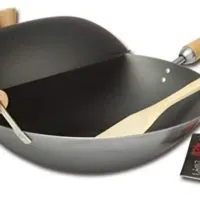 Joyce Chen 21-9972, Classic Series Carbon Steel Wok Set, 4-Piece, 14-Inch Charcoal
Joyce Chen 21-9972, Classic Series Carbon Steel Wok Set, 4-Piece, 14-Inch Charcoal -
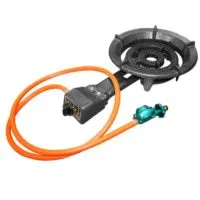 Alpine Cusine BS-400 Propane Burner
Alpine Cusine BS-400 Propane Burner -
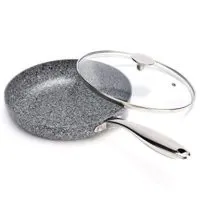 MICHELANGELO Nonstick Frying Pan Stone with Ultra Nonstick Granite Coating, 10 Inch Frying Pan with Lid, Nonstick Skillet Pfoa Free, Non toxic Rock Pan, Induction Compatible -10 inch
MICHELANGELO Nonstick Frying Pan Stone with Ultra Nonstick Granite Coating, 10 Inch Frying Pan with Lid, Nonstick Skillet Pfoa Free, Non toxic Rock Pan, Induction Compatible -10 inch
Nutrition Information:
Yield: 1 Serving Size: 1 large servingAmount Per Serving: Calories: 1273Total Fat: 51gSaturated Fat: 10gTrans Fat: 1gUnsaturated Fat: 38gCholesterol: 543mgSodium: 3257mgCarbohydrates: 127gFiber: 5gSugar: 43gProtein: 73g
This data was provided and calculated by Nutritionix on 6/15/2019

Yangzhou Fried Rice: A Flavorful Dish You Can Make Yourself
Sunday 12th of January 2025
[…] To make your presentation stand out, arrange the ingredients nicely on the plate. Use shrimps, Char Siu, and scallions to add texture and color. For more tips on making yangzhou fried rice, check out this website. […]
Delicious Young Chow Fried Rice: A Chinese Classic
Friday 8th of November 2024
[…] https://tasteasianfood.com/yang-chow-fried-rice/ […]
John Gustavsen
Saturday 8th of February 2020
Hello Kwan I am eager to make this dish! I already have some frozen cooked shrimp ready to eat. Can I thaw the shrimp and use it this way in the dish?
KP Kwan
Saturday 8th of February 2020
Hi John, Sure you can. Thaw the shrimps, drain and dry with a kitchen towel, and you are ready to go! KP Kwan
Herman Gersten
Wednesday 5th of February 2020
Hello Kwan, After my success with your char siu recipe, I immediately started your Yang Chow rice. The delicious dish, using the fresh char siu was an immediate hit. Not a grain was left. Many thanks!
KP Kwan
Friday 7th of February 2020
Hi Herman, Glad to know that it works well. Looks like you will a Chinese cooking expert real soon. KP Kwan
Justin
Tuesday 10th of September 2019
I think Sesame oil is esential in "finishing" the cooking process
KP Kwan
Thursday 12th of September 2019
Hi Justin, The typical Chinese does that, add sesame oil the last minute without heating it to avoid it from losing flavor. You can add that if you like the taste. KP Kwan